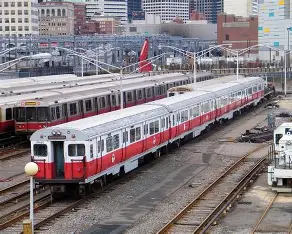Industry News
Boston Train Cars Detained by Customs for Forced Labor Allegations
TweetJul. 29, 2025
By:
Ashley J. Bodden

With the constant stream of new and changing tariffs, it can become easy to forget about other trade priorities. However, the experience of the Massachusetts Bay Transportation Authority (MBTA) is a reminder that issues like forced labor are still enforced by Customs.
Earlier in July the MBTA announced that eight of their train cars shipped from China are being detained at the Port of Philadelphia by CBP over allegations of child and forced labor violations. For years CRRC, a Chinese company, has been delivering Orange Line and Red Line cars to the MBTA to update its old subway fleet. CRRC ships the train car shells from its main plant in China to its Massachusetts facility in Springfield, where final assembly takes place. While there have been holdups on deliveries from China in the past, this time there are fresh concerns that CRRC violated the Uyghur Forced Labor Prevention Act.
While CRRC does not appear on the UFLPA Entity List, it does not prevent CBP from investigating allegations of forced labor violations. If the company is unable to show Customs that its supply chain is free of articles made using forced labor, the subway car shells will be denied entry into the United States. This is true of goods investigated under UFLPA and more generally of goods made with slave, prisoner, or child labor.
Separate and apart from the UFLPA issues, allegations have been made that cars manufactured by CRRC in the United States included mica mined in Africa by an army of children. Erik Olson, Executive Director of the Rail Security Alliance cites a 2020 report by the Australian Strategic Policy Institute that CRRC is one of the manufacturers using forced labor. This report was supported by a 2025 investigation by the New York Times and the Bureau of Investigative Journalism. Officials for the MBTA have said the CRRC have responded to two information requests about the subway cars from CBP and are currently working on a third, and that the allegations of non-compliance with the law are unfounded.
The delays that MBTA is experiencing (not to mention its riders) arises from a compliance issue that is 100 years old. Importers need to remember that even in the current challenging environment the old compliance issues remain relevant. If you have questions about supply chain diligence, forced labor, or the UFLPA do not hesitate to contact an attorney at Barnes Richardson, & Colburn LLP.
